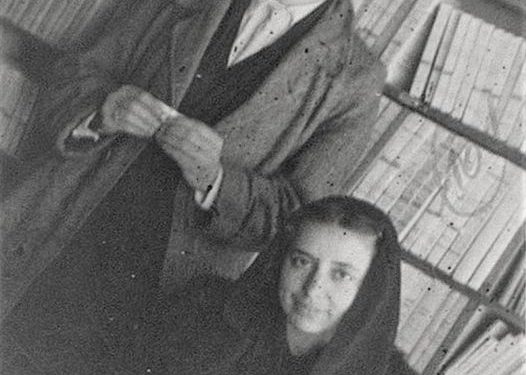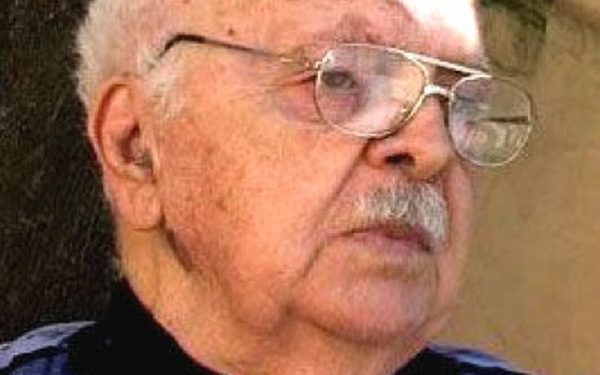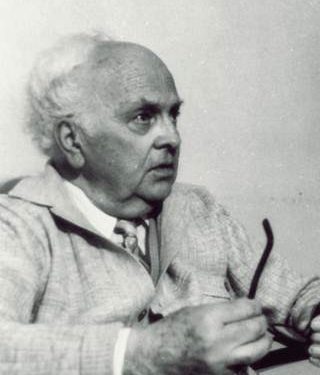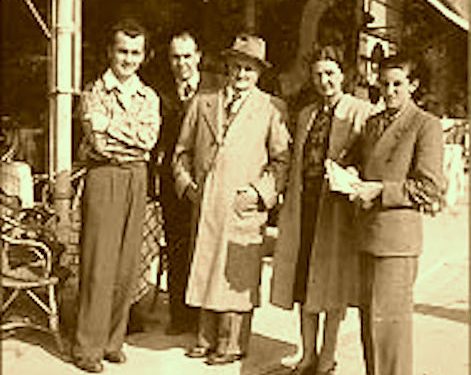By Shaqir Rexhvelaj
Memorie.al / On March 7, 2008, our honored professor, Ramadan Sokoli, we wished him a teacher’s day with a bouquet of mimosa flowers (how much he loved flowers) and as if in agony, he smiled lightly, pronouncing a “thank you” “, but also with great regret; that we read in his eyes, that he felt that they were perhaps the last flowers, that they were smelling. After four days, on March 11, 2008, his life was extinguished, leaving his name and works to shine forever. Ramadan Sokoli is our brightest figure of national culture, in the field of musicology, he is the creator and founder of this new science, which took root or rather, was planted as a science by him, since the beginning of the 50s of the century we left behind.
Professor Ramadan Sokoli is not only a great scientist but also a great patriot. As it has been described by the media and the press, we can call him shamelessly, also as the last renaissance, relying on his large family, in the ancient city of Shkodra, on his grandfather, Hodo Pashë Sokoli, participant in the League of Prizren and protector of the Albanian territories of Plava, Gucia, and Ulcinj, to his father, Isuf Sokoli, also exiled in Italy, to come to his brothers, Ibrahim Sokoli and Hodo Sokoli, who together with Radon, experienced the fierce communist persecution, suffering over 40 years in prison. All bright intellectuals and patriots.
I met Professor Ramadan Sokol for the first time in June 1957, at the folklore festival of the Shkodra District, where I was a participant performing the folklore of Malësia e Madhe, and he was a member of the jury, where they selected the talents they would receive part in the Student Youth Festival, which was to be held in Moscow, in the months of July-August 1957. Fate and life brought him from that date, until he closed his eyes, to be an honor to the people closest to him (outside his circle), at first as the object of his work, me as a carrier of folklore, he as a researcher of folklore and later, a student of his class, at the Artistic High School “Jordan Misja” in Tirana, in the Flute branch, then his student at the State Conservatory of Tirana and after studies, as a friend and housemate, of a family with “biographical problems”, but wonderful in the traditions of hospitality and with a wonderful circle, both from the professor’s side, but also of his wife Lili, tyrant from the family – Petrela, a rare ideal woman, which you can only find in novels.
Perhaps this was also the greatest luck that the professor had in his life troubled by the regime. In 1958, when I started learning in his class, for the flute, at the Artistic Lyceum, I collaborated with the professor, as an authentic bearer of the folklore of the Great Highlands, reproducing the songs and melodies of our area, starting from the characteristic songs ” majekrahit” and other songs, without musical accompaniment with a pastoral character, rhapsodic songs with lute, various melodies on the popular instrument, “Zymare”, some melodies that I had created myself, but also many different children’s lullabies and lullabies, which to my surprise at that time, he gave them a very great importance, of course seeing them with the eye and attention of a researcher, he threw them into musical notes, on several large sheets of music. Later they took place alongside many other researches in his ethnomusicological studies.
But let’s say on this commemorative anniversary, something more about his life and work, something more. He showed his musical talent as a child, in his hometown, Shkodër, a city known for its great cultural traditions, especially in the field of music. Since the end of the 19th century, the first orchestral formations were created in this city, such as wind orchestras, which can also be taken as the first beginnings of laying the foundations of professional music, together with church music, but it that constituted the core of the musical culture in Shkodër, that the tradition of the creation of Shkodër’s civic song, quite unique in its kind, from the simplest types to the most complicated ones, such as “jaret”, being thus very important part of the golden fund of Albanian musical culture. In this atmosphere and in these realities, Ramadan Sokoli also grew up, among the wonderful sounds of the music of the “Shkodra party” and wind orchestras, that’s why he played some instruments in the city band, but more to the heart in his youth, there was the instrument of the guitar, or as it is commonly called, as “piano of the poor.”
With this musical background and several creations in the field of singing in 1940, he enrolled and continued his studies at the conservatory “Luigi Cherubini” in Florence – Italy, for composition and flute. After his studies, he returns to Albania, with the dream of a young man, to put his western knowledge and culture at the service of the country. But after the Second World War, the communist regime was installed in our country and unfortunately its ideals, views, but also family tradition and pluralistic Western culture, conflicted with the new principles of this regime, as it turned out to be infamous for Albanians. Since he openly displayed these views in the social circles in Shkodër, especially during the anti-communist uprising of Postriba in 1946, he was arrested and sentenced to 5 years of imprisonment.
Ramadan Sokoli, as he told me, the years in prison transformed him radically, especially in getting to know life and its people inside the prison bars, with “knowledgeable intellectuals, clergy, bajraktars, rich people, merchants, mountaineers, of a tradition which flowed for centuries in the Albanian way, but which was seriously endangered, in front of a new regime, outwardly popular, but which only we who lived behind bars, understood how unfair and merciless it would be for the Albanians. In the prison and in the concentration camps where I worked with the prisoners – he said, – I got to know the true character of the Albanian, knowledgeable and simple men, brave and invincible in the face of torture, but who were also the core of the nation, none of them I only learned, but I also wanted to start the first notes, thrown on pieces of paper and blocks of paper about the Albanian national culture, about the folklore about ‘riddles’, about the customs and customs, which were so rich and varied, from one storytellers to the other e, with a stretch; from all over Albania”.
The first notes and the genesis of the first ethnomusicological studies, prof. Ramadan Sokoli has years of his life in prison. “Every bad has a good”, he often repeated. He used the prison years as much as he could to collect the first nectar of the tradition of popular culture, to which he dedicated his entire work, thousands of pages written in about 20 musicology books, without mentioning here the musical creativity in several fields of her, from her elaborate song, to the many instrumental works, from miniatures, to symphonic poems, chamber music and concerts for the instrument of the flute, to the method for the flute. The first serious publications in musicology with an international character have started with the publication;-Les dances populaires et les instrument mousicaux du people Albanais – Tirana 1958.
This publication had a special interest in the Balkan and European musicological circles and, not too long ago, Professor Ramadani created an exchange letter with many musicologists from different countries.
Especially from Russia, Bulgaria, Romania, Hungary, East Germany, but also from Western countries. Of great scientific interest to Professor Sokol were the organization of two musicological scientific expeditions, organized in different parts of Albania, but mainly in its South; the first in 1958, with German scientists (musicologists); Shtokman and Fidler, as well as the second expedition with Romanian scientists, led by Romanian musicologist Mrs. Comichel, in the 1960s.
These expeditions from the Albanian side were led by prof. Sokoli and a copy of their recordings are today in the audio library of the Institute of Popular Culture. The practical methodology of collecting different genres of folklore in the field constitutes a great scientific experience for Albanian musicology and at this time, a new stage begins in the study of this rich and virgin folk culture, as for Albanian researchers but , especially for foreign researchers. This is also the period when the internationalization of Albanian musicology begins.
So in the 60s-70s, Prof. Sokol publishes the major work; “Albanian Musical Folklore” (Prosody and Morphology) “Musical Instruments of our People” (Organography), “Dances and music of our ancestors” (Illyrians).”Chanson populaie albanaies (Albanskie narodnie pjesni), second volume, “Illuminated Figures of Albanian Culture in the Centuries”, (Jan Kukuzeli, Andrea Aleksi) “Folkloric Traces”, “The Figure of Skënderbeu in Music”, within the 500- anniversary of our national hero. After these publications in Albania, but also after the publications made by German and Romanian scientists, in international folklore forums with their studies; Albanian musical folklore was internationalized as a precious asset with a special identity of creativity, in the field of homophonic and polyphonic songs, in rich dances with varied rhythms with folk instruments, which transmitted from generation to generation, the spirit of the original pastoral melodies, with such beautiful and unique costumes, such as the “jubleta” of Malësia e Madhe”, that is, the creative spirit of our people over the centuries, was being studied and analyzed in a scientific way, facing the cultures of other peoples, with uniqueness and identity unknown until then, even scientifically, and for this, Professor Ramadan Sokoli, without a doubt, deserves special credit.
In these years, the Institute of Popular Culture was created, with the branch of musicology, and young scientists, but also those with experience, undoubtedly created a new layer, with new studies and contributions, expanding and deepening scientific studies, but also the international representation of this science in study forums, but also by enriching it with new expeditions. But in the communist regime, the more the class war intensified and intensified, the more difficult the work and scientific work of Professor Ramadan became. For biographical reasons that followed him like a black shadow until the early 90s, he never had his works published, easily and without difficulty! Sometimes special works ended up on cardboard, because he refused to be written in the prefaces of his books; “under the leadership of the comrade’s party… popular culture has reached”, etc. etc.
I even remember in 1965, they had returned the corpus from publication; “Musical instruments of the Albanian people” (Organography) for this reason; the editor of the Publishing House, had told him that at the beginning of the book, there should be an expression of the leader of the party, which according to him, are both very striking, but also current for the popular culture. I met the professor, he was very upset, I asked him what was wrong and he told me the editor’s remark. In the conversations with the professor, I had created such confidence, which he himself had given me, and I often used an ironic style of speech, and I said to him: “He said well, there are many beautiful ones, why don’t I put one of them and everything is solved very easily”?! He looked at me out of the corner of his eye and, having a lot of faith in me, said: “But those are not his expressions, they have been stolen by great people, and I cannot put in the introduction to my books, expressions of stolen, then any politician, to give sentences about folklore, he is not a scientist, for me to quote him”.
“But he is a philosopher,” I told him, “and philosophical thought leads, but also inspires,” again with an ironic tone. “I’m in trouble, – he said – you’re breaking my head”, but in a not at all friendly tone, even in a rude way and the professor was getting angry, it was very difficult for him to agree, I can even say that it was a shortcoming his. Ramadan Sokoli was a man of wide culture, a polyhedral figure in the best sense of the word. With him you could talk about any field of art, but also humanities, finding professional and contemporary answers, that is, a living encyclopedia. His library at home was very rich not only with musical literature, scores, but especially with philosophical books, artistic literary criticism, but it was also a chance that his wife Lili, worked in the National Library, and any book she needed for study work, could and provide it by ordering it from abroad.
In order to publish his studies, in addition to the correspondence he had with many musicologists, he used the magazine “New Albania”, which also appeared in foreign languages, but also Radio-Tirana shows, a column; “To know our musical traditions”, which he often explained himself on the microphone. Later, many scientific publications found the light of publication in the magazine “Les lettres Albanais”. Professor Ramadan Sokol received many invitations from international musicological congresses, from Moscow, Tokyo, Paris, Rome, Budapest and even America, but he never participated in them, and this was not only a loss for him personally, but for not properly representing our ethnomusicological culture in these forums and to the detriment of our culture. What is to be emphasized and underlined, is that this great scientist, all the works he wrote, realized being a simple teacher, in the “Jordan Misja” artistic high school (Liceu Artistic), with a norm of complete and teaching, not only in the flautist branch, which he founded, but also solfeggio, harmony, chamber music and, later, musical folklore.
Even when the State Conservatory of Tirana was founded in 1962, his students taught in this high institution of music, while he did not, but he never gave himself up, he continued to produce and teach, with a devotion that it is only in the nature of particular people and making their own and their country’s history. Ramadan Sokoli, was the first to prepare the text of musical folklore and the Ministry of Education and Culture of that time, not without difficulty, approved it for the education of the new generation of musicians with the popular and folkloric national culture, giving a new physiognomy to the school ours, but also its national character. And to our surprise, (we were students at the time), the professor came and taught as an external lecturer, free of charge, the subject of musical folklore, which he himself had adapted for the Conservatory.
Ramadan Sokoli, with his bright mind, brings us a creativity with ethnomusical studies from our antiquity, with “Dances and music of our ancestors”, the Illyrians, as a passionate tracer, enriches our cultural fund and our musical culture , discovering giant figures, such as Nikete Dardani and Jan Kukuzeli, illuminating century after century with the illuminated figures, as in the book “16 centuries”, until our days, to come to his creativity, such as songs; “Blegëron delja”, “Turtullesha”, etc., where he is presented to us not only as a researcher, but also as a creator with a very special musical poetic sensibility. His ethnomusicological researches are new paths that are trodden for the first time by this passionate researcher, who stands out for the depth of thought, the breadth of the cultural horizon, as well as the seriousness of the scientific judgment of the subject, which he takes as the object of study.
Taking a brief look at the research works of Prof. Sokol, we note with pleasure that it extends to 20-centuries of the ethnicity of our nation and constitutes undeniable values in our cultural pantheon, but our honorable professor, throughout his activity during the period of the communist regime, has no appreciation whatsoever small, for his works and not even a “Letter of praise”, from the ones that were usually given by the Professional Associations. Often with irony and cynicism about the regime, the professor said that the only “Leaf of Honor” he received was in military shooting in the choir, which, surprisingly, coincidentally, turned out brilliantly. The democratic changes in our country found Professor Sokol at the age of three, in his 70s, after he had spent all his knowledge and effort to put everything to the benefit of the national culture, but without any appreciation and without the slightest attention , to reward him with titles or other honors.
It was the government of the Democratic Party and the institutions established by it, that appreciated the work and work of musicologist Ramadan Sokoli. The year 1995 should come, when our Academy of Sciences awarded him the title “Professor”! In 2000, the International Center of Biographies in Cambridge, England, included him in the Encyclopedia of Eminent Personalities. In 2002, by the President of the Republic, Mr. Alfred Moisiu, was awarded the title “Grand Master” and after that his hometown, Shkodra, the City Council of this city, gave him the title; “Honorary citizen”. In 2006, the National Center of Folklore Activities awarded him the medal “Emblem of Albanian Culture” and within this year, ABI (American Institute of Biographies), awarded him the diploma; “Expert in Ethnomusicology and Composition”.
Professor Ramadan Sokoli is also known as a well-known journalist. He has treated in the press of the time, articles with a scientific and cultural character, such as; in the magazines “Nëntori”, “Science and Life”, “Popular Culture”, etc., focusing mainly on the problems of ethnomusicology, he wrote scripts for documentaries of the former Kinostudio “New Albania”, but especially for radio shows television, with hundreds of study articles, textbooks, reviews, etc. A bright and not very well-known page is the musical creativity of Professor Ramadan Sokol in different genres, but it deserves a look with a cognitive, scholarly and publishing character, because there are also many works that have not yet seen the light of public execution.
On this anniversary of his death, we only recalled this bright figure of our national culture, but the work of Professor Ramadan Sokol deserves to be more of a study object of the Academy of Sciences, as well as the attention of the Ministry of Education, and that of Culture, Tourism, Youth and Sports, to prepare a complete collection of the work of this colossus of our musicology, according to the publications so far, leave much to be desired and this may happen, when Ramadan Sokoli has an anniversary of his birth .Memorie.al
















